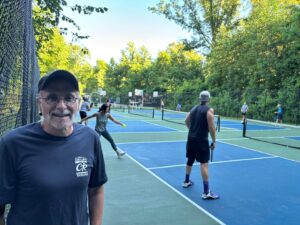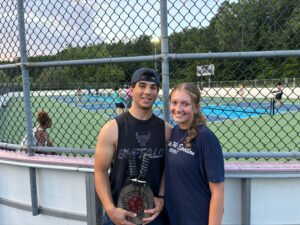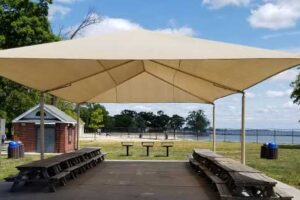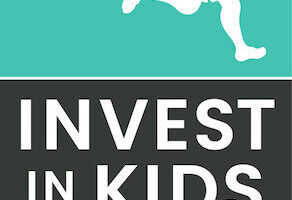
It is now possible to play pickleball in Peekskill. But with nine courts, the in-vogue sport’s local locus is Cortlandt.
Invented in Washington state during the 1960s, pickleball mashes up tennis, badminton and paddleball and is now the fastest growing athletic activity in the country, according to the Sports and Fitness Industry Association.
Many players say there can never be enough courts. “We put in four [near Walter Panas High School] a couple of years ago and got swamped with phone calls indicating that we need more,” said Ken Sherman, the town’s Director of Recreation.
It’s free to play, though the courts are designated for residents only. Non-residents may play as guests. Park rangers make the rounds during summer months to remind people of the rules, said Sherman.
“If we enforced it with an attendant checking IDs, we’d have to charge people,” he said. Last fall, his department converted a roller hockey rink near the train station into five courts.

Before Covid, the rink attracted enough activity to install lights. “They had a league, it was really popular and then it just died,” said Sherman. No residences surround the site, so the town leaves the lights on until 10:30 for the ballers.
Beyond the social and physical aspects, the game’s appeal is simple to grasp. “It’s communal and accessible,” said Cortlandt resident Mike Vaccaro, who learned the game in gym class. “It doesn’t matter, man, woman, young, old, or skill level. Everyone can get something out of playing.”
The low bar for entry consists of a ball, a paddle and a place to swing. Players chase the hard wiffle-like ball with small Swiss-cheese holes, but the low-key sport unfolds on a small court, so serves are made from beneath the hip.
Peekskill was scheduled to open four courts in DePew Park in July. The city plans to charge a nominal fee to support an attendant and allow residents to reserve court time.
“Pickleball Paul” Pacchiana runs clinics and camps in Peekskill and Cortlandt with Beth Shea, a racquet sport instructor at Premiere Athletic Club in Montrose. He is interested in sponsoring tournaments, but nothing’s set yet.
“For some people, it’s like an addiction or a disease,” said Pacchiana. “They play for hours and hours,” like a wholesome cult.
Some players seek high skill-level competition, but most folks who populate the local courts seek to socialize and get their ya-yas out.
“It’s easy to be good at it, but it’s hard to be great,” said Elena Baldo, who lives in Cortlandt. “That’s the appeal.”
Several signs from the site’s skate park period still adorn the train station courts. Not everyone is pleased with the transformation. Someone recently pasted a small handwritten note over one of the bright orange signs reinforcing the skateboarding ban.
“Shame on you,” it read. “You take away a safe place to skate and are unwilling to coexist. Skate wheels do not cause damage, no worse than racquets or shoes. Bicycles maybe do. Your selfishness is disappointing.”
There is a town skateboard park, with ramps, on the grounds of the Muriel H. Morabito Community Center, said Sherman.
On any given day, the assortment of pickleball participants represents a cross-section of ages and abilities. Some gimp along, others move like gazelles. Everyone gets a workout and has fun, including the hyper-competitive players, who find each other.
“When I talk with people about pickleball, and a lot of devotees can’t stop talking about it, you would not believe the emotion that comes forth,” said Pacchiana. “A lot of people, some of them retired and lonely, are finding friends and community.”
Marc Ferris is a regular contributor to River Journal.







Playing pickleball releases endorphins which are chemicals (hormones) that help relieve pain, reduce stress and improve your sense of well-being. Want to be healthy and happy? Move. Pickleball is a lifesaver for most people. We had 10 friends playing tennis Sunday which is good. But Saturday there were 88 people playing pickleball on 4 converted tennis courts. I recorded over 14,000 steps.